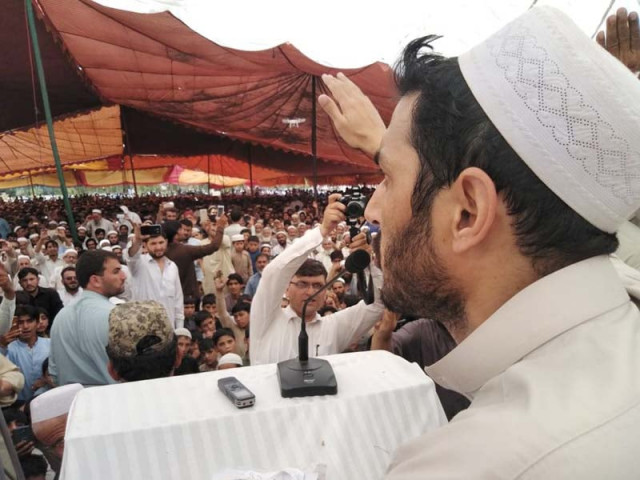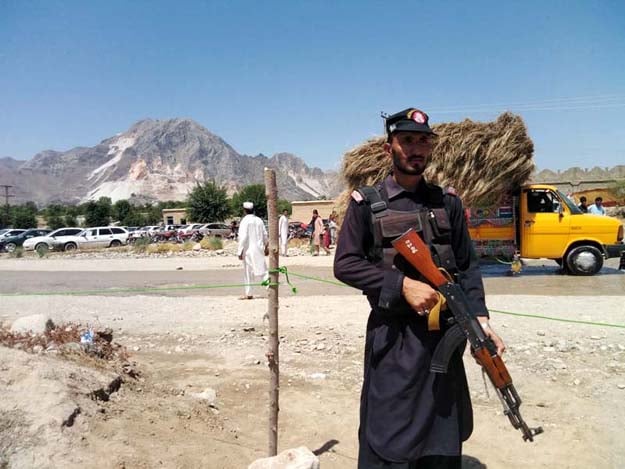Democracy returns to Safi after a decade
First major election rally held as two-time MNA launches campaign

An election campaign being held in Safi, K-P where after a decade of militancy, peace and democracy has been restored. PHOTO: EXPRESS
Over a decade later, the area has seen its first substantial election rally and is preparing to go to the polls without the cloud of militancy hanging over them.
PTI loyalists claim they were ignored for electoral tickets
Around 7,000 people turned up for an election rally held in Jhanda Lakaro area of Safi recently as former Senator Hilal Rehman campaigned for his brother, local national assembly constituency NA-42 hopeful Bilal Rehman.
This was arguably the first large electoral rally in the militancy-hit Jhanda Lakaro area after militants took over Safi over 10 years ago and turned it into a killing field, beheading their opponents there.
After the militants had taken over the area in 2007, a small military operation was conducted in the area after the 2008 elections. It was followed by a larger operation in 2011-12 to force out the militants. By the time the next general elections, in 2013 rolled around, most of the residents of the area were still in camps living as internally displaced people (IDPs) waiting for the authorities to give the all clear to return to their areas.
The turnout was predictably quite low at 29.92 per cent, but Bilal managed to bag a second consecutive term from NA-36 as an independent candidate.
While peace may have been restored, it seems electoral interest has waned.

In the 2013 elections, 39 candidates were in the running, including from major mainstream parties such as the Pakistan Peoples Party (PPP) the Jamaat-e-Islami (who secured the second most votes in the constituency after Bilal), the Pakistan Tehreek-e-Insaf (PTI), the Jamiat Ulema-e-Islam Fazl (JUI-F), the Pakistan Muslim League-Nawaz (PML-N) and even the Muttahida Qaumi Movement (MQM).
This year, however, Bilal is facing competition from 18 candidates.
The number of registered voters in the district have also increased in the past five years, from 179,304 in 2013 to 255,522 now. Of these, 158,843 are men and 96,679 are women.
The ECP plans to set up 187 polling stations in the district, including 76 for men and 51 for women and 69 combined stations. Of the these, 44 polling stations have been declared as most sensitive.
Around 24 polling stations are located in upper Mohmand, most in Safi which has 54,346 registered voters.
Reports about disruption of elections
Freedom of franchise
Hanging on to his seven-year-old son Mustafa, Ali Gul tries to get a glimpse of the stage and strains to hear what Hilal is offering to the tribesmen of the area.
He tells The Express Tribune how seven years ago his house had been attacked by the militants and his wife killed for giving shelter to an injured security official.
“No one was allowed to enter Safi without seeking permission from Umer Khalid Khursani, who led the Tehreek-e-Taliban Pakistan (TTP) faction which ruled Safi at the time,” Gul recalls.
Pointing at the large crowd, Gul said that this was not possible in 2008. When elections were held, the Safi native says their polling station was set up in the safer, Ghallanai.
As a result, Gul said, most of the residents of Safi could not vote.
Alamgir Khan, a levy official tasked with guarding the gathering, looked relaxed. No longer does he have to remain on his toes to look out for militants.
“When we were first deployed in the area around seven years ago after the military operation, this was a ghost town since most of the residents had fled the area,” Alamgir told The Express Tribune.
He added that when the militants infested the area, they regularly saw roadside bombs go off or militants attacking them in targeted killings.
“It was very crucial time for us as we were under constant militant attacks, especially at night,” he said.
Mohammad Issa, the organizer of the event, said that he had to drop out of school in the seventh grade due to militancy in the area.
“Now, we have returned to our homes and have been able to arrange this gathering,” he said.
With IDPs returning and the ECP establishing polling stations throughout the district, Issa hoped that unlike in 2013, a majority of the registered voters will cast their vote this time.
While he hoped that most of the men will vote, he was unsure if the women will follow equally, especially in the combined polling stations.
Published in The Express Tribune, July 4th, 2018.













COMMENTS
Comments are moderated and generally will be posted if they are on-topic and not abusive.
For more information, please see our Comments FAQ